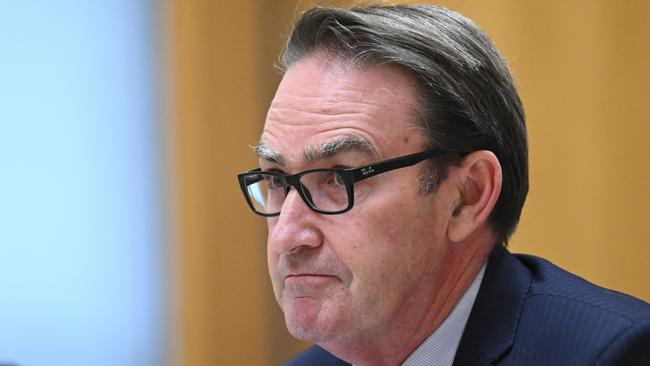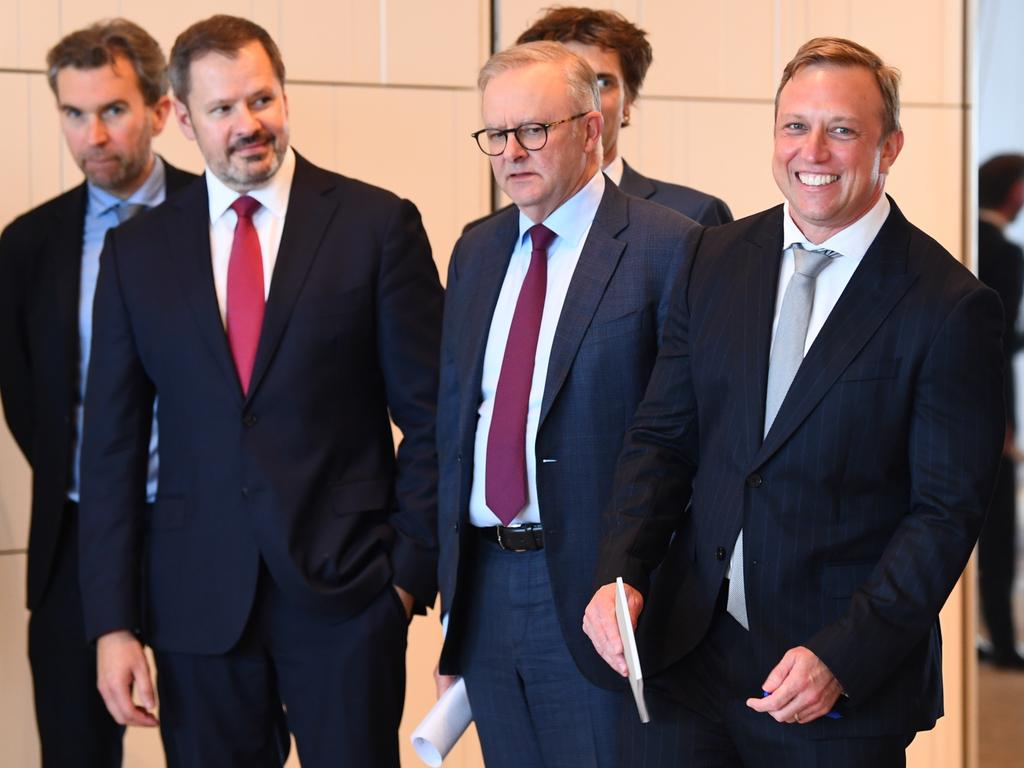Treasury secretary hoses down talk of company tax cut
Treasury secretary Steven Kennedy has warned that cutting the company tax rate risks pushing the country into an ‘unsustainable fiscal position’ if it isn’t offset by higher taxes elsewhere.

Treasury secretary Steven Kennedy has warned that cutting the company tax rate risks pushing the country into an “unsustainable fiscal position” if it isn’t offset by higher taxes elsewhere.
Dr Kennedy also said that Wednesday’s national accounts would reveal a “very weak” economy at the start of 2024, amid forecasts by private sector economists that growth may have ground to a halt in the three months to March.
The comments at Senate estimates on Monday suggested there was little bureaucratic support at the highest level for Industry Minister Ed Husic’s recent suggestion that the 30 per cent company tax rate should be reduced amid a government-led effort to build the green industries of the future.
But Dr Kennedy shot down that proposal in the context of the country’s battle to close structural budget deficits.
“One of the challenges for governments is … fiscal sustainability, and I think in the light of the current circumstances, the company tax rate is appropriate,” he said, noting that “on balance” the Australian tax system was not “particularly uncompetitive” internationally.
“Company tax cuts that lead to an unsustainable fiscal position would clearly be bad,” he said. “So that’s why it always needs to be set in a broader context. All conversations about tax reform, in my view, should be nested in our budget and our ongoing budget position. And so at the very least, one would think they would start from the position of being revenue neutral.”
Australia’s corporate tax rate is the third-highest among OECD countries, behind only Portugal (31.5 per cent) and Colombia (35 per cent), and on par with Costa Rica and Mexico.
Experts such as ANU Tax and Transfer Institute director Bob Breunig have endorsed lowering the company tax rate to at least 25 per cent, saying it would boost investment, growth, employment and wages.
Finance Minister Katy Gallagher in estimates also said Australia’s corporate tax rate was internationally competitive. As Dr Kennedy hosed down any plans to ease the tax burden on companies, he also shot down calls for income thresholds to be adjusted every year to combat the steady rise in average tax rates, saying returning bracket creep to workers should be left to the government of the day.
The blow to consumption from intense cost-of-living pressures and high interest rates is driving a slowdown in economic growth.
Economists predict real GDP growth may have slowed to a standstill in the March quarter after growing by just 0.2 per cent over the final three months of 2023, which would drag annual growth to 1 per cent and to its lowest in more than three decades, outside the pandemic.
Dr Kennedy said moderating inflation, higher wage growth and tax cuts would “bolster” real household disposable incomes in the second half of this year, “which we expect will support a recovery in household spending”.
“In contrast to household spending, private business investment has been growing strongly,” he said, and noted that “despite the recent slowdown in economic activity, the labour market has remained resilient”.
He said he was not “particularly concerned” with recent figures showing inflation accelerated from 3.4 per cent to 3.6 per cent in the two months to April, and that he expected consumer price growth would resume its downward trend. The decline would “be bumpy”, he said, as it has been overseas.
“In other countries where inflation has declined, it’s bumped back up, it’s then gone back down again, and then has continued to decline. And that’s what I expect to happen in Australia,” he said.
“Yes, it (inflation) is still a good half percentage point outside the (RBA’s inflation target) band, but that is substantial progress compared to the above 7 per cent that we saw some time ago.
“My own view is inflation is headed in the right direction, the balance of policy is working towards it. I’m confident of that outcome. And I have not been particularly concerned by changes in the monthly statistics.”
The Treasury secretary has played down the half-a-percentage-point difference between the budget and the Reserve Bank’s inflation forecasts, saying the variation mostly comes down to the $300 energy bill rebate for all households announced in the May budget. Treasury predicts inflation will drop from 3.6 per cent to 2.75 per cent by mid-2025 – and inside the central bank’s 2-3 per cent target range – against the RBA’s February forecast for 3.2 per cent over the same timeframe.
“We are probably a little more concerned about the weakness in growth and the potential for the unemployment rate to be a little higher,” Dr Kennedy said.
Treasury distanced itself from the Albanese government’s recent $470m commitment to build a world-first quantum computer in Brisbane, saying the decision was led by the Department of Industry, Science and Resources.
Questioned about the government’s $1bn commitment to develop a local solar panel manufacturing industry, deputy secretary Luke Yeaman said it was “subject to the criteria outlined” in Treasury’s framework, even though the announcement preceded the published document.
He did not argue that other countries, such as China and India, could make such panels cheaper, and instead framed the decision as an “an insurance policy” in the context of building economic resilience.
“Under the National Interest Framework (released by Treasury at the same time of the budget), there are two streams: one is about achieving net zero, and one is about economic security and resilience,” he said.
“The investments the government’s made in solar and battery manufacturing are under the national security and economic resilience stream.”






To join the conversation, please log in. Don't have an account? Register
Join the conversation, you are commenting as Logout